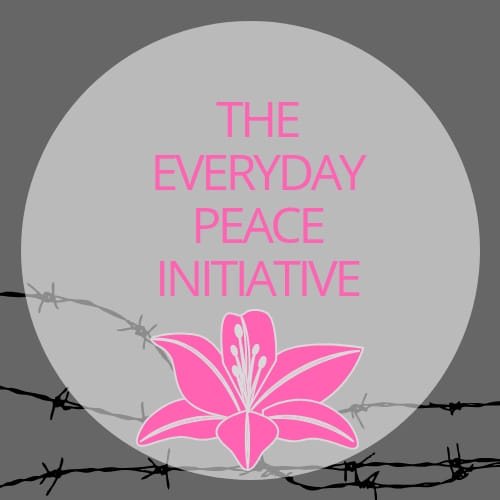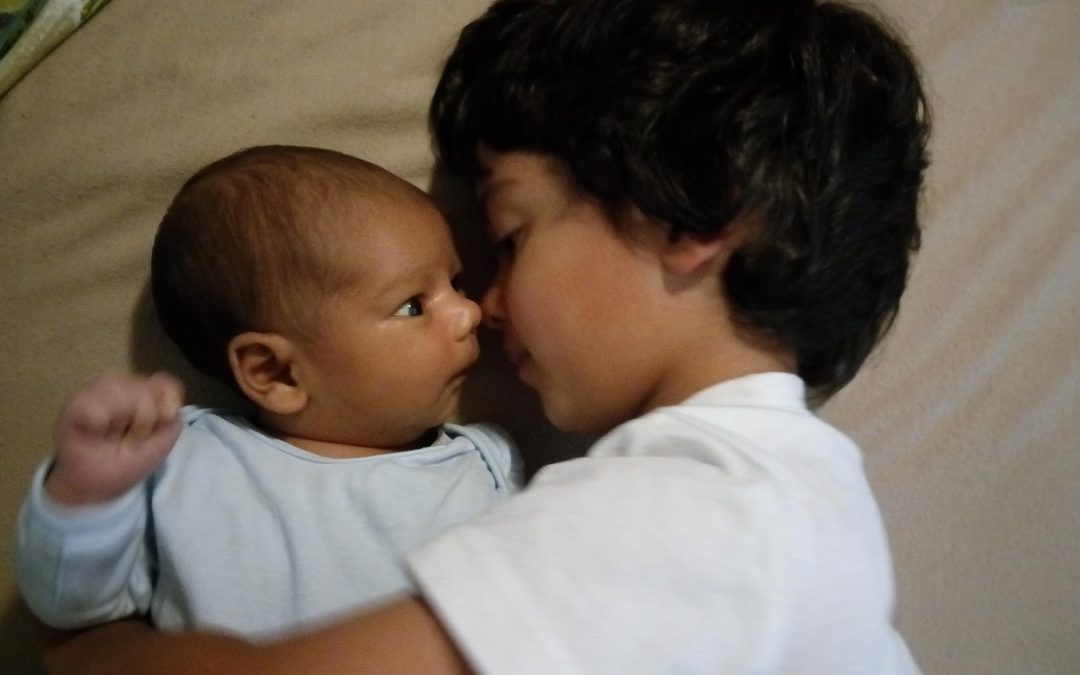Sibling rivalry can be a stressful daily challenge for parents of kids of all ages. When this happens, parenting advice often focuses on the individual child-parent relationship. When a new baby joins the family, we are reminded of how difficult it is for the elder sibling to have a new tiny family member in the house who steals mum and dad’s attention away. But is children’s frustration always just an expression of a competitive demand for parental love?
When I was pregnant with my second baby, I worried too. I couldn’t stop thinking with a deep sense of guilt of how my three years old son would react once he saw me with another baby in my arms. Would I be able to dedicate as much energies to him? When my second child was born, the change in the relationship with my eldest son Rishi deeply affected me. Until then, my whole life was centered around him, and this exclusive relationship suddenly changed with the birth of his baby brother. Of course, I did not love him any less, and there was another new love in my life. Yet, there was a sense of loss in me that I was not prepared for. But those were my feelings and my fears. There was something else I did not the expect: Rishi’s devotion for his brother.
I mean, I knew he would love him, but I expected mixed feelings and perhaps some resentment, I guess as a result of my fears. But when Rishi met baby Raghav, he looked at him as the most beautiful thing in the whole world – more than all his trains, toys, and even mamma. Still does.
It was not always easy, not at all. I did struggle, particularly the days I was alone with the two of them. There were times when my eldest became unsettled and wanted attention. This frequently happened when the little one needed soothing, for example while feeding or making him sleep. In those moments, I really, really wanted Rishi, my three years old, to stop disturbing. I would get really anxious because I wanted so much to put the baby to sleep and spend that one-on-one time with him. I would get angry and he ended up having meltdown. When I finally gave Rishi the opportunity to explain why he behaved like that, the answer was always the same: he wanted to kiss his brother or hold his hand. He wanted to connect with him and either he could not or was not allowed to. This was the main reason for so many of his meltdowns. He needed his brother when he felt vulnerable.
I realized that my eldest needed attention, but not just mine. He longed for his brother as much as for me, or perhaps even more. He felt safe and loved with him. He could not understand the limits and boundaries I put between him and his brother, for example why a baby had to sleep all the time, or physical separation when each of them had to be in a separate bed, room, or car seat. Sometimes, the frustration when he was unable or prevented from connecting with his brother -like when I am trying to put him to sleep – led to aggressive behavior towards the baby.
Rishi had a desire to connect with his brother, but that was not easy. Baby could not talk or play with him. He could only cry and feed from mamma. Rishi was frustrated when Raghav cried. What was the problem? What could he do to help? He often tried something to soothe him – singing or showing him a rattle. He was delighted when he was successful. But if baby Raghav went on trying, Rishi either felt helpless or took it as a rejection. I kept reassuring him that his brother loved him, and helped him understand and interpret signs of that love. As Raghav started growing, he became more responsive, too. He could now smile at Rishi, show interest, and call him. Every stage of growth brought more challenges, too. Raghav could now take Rishi’s toys and threaten his Lego constructions.
Children are still developing social skills, and having a sibling gives them plenty of opportunities to practice them. Frustration and fights are a natural, and very important part of this learning. That is how they learn how to make peace. A crucial part of this learning is interpreting the other child’s emotions, needs, and intentions, as well as their own. They learn from how we adults react to their interactions, and take our comments seriously. Siblings fights are often an expression of a desire to connect with the other child and the frustration resulting from the inability to do it effectively in some circumstances. If you try to separate two children when they are fighting, you may find that they do not want to. They have an urgency to keep engaging. These can be excellent occasions to help children understand the other child’s needs and emotions, and to help them feel that mutual desire for connection.
The more children grow, the more complex their emotions become. We may unintentionally contribute to creating feelings of rivalry through the way we respond and interpret their relationship, so it is a bit of a self-fulling prophecy. We may contribute to feelings of resentment and rivalry when we tell children negative things about that relationship, for example when we take one side during a fight, or shame a child for hurting the other, or make them notice how better behaved the other is. Feelings of shame do not encourage empathy. Experiencing it does.
The reason why we adults may respond in these ways to children’s interactions, in turn, is due to how we, as parents, see and interpret our children’s relationships. If we want to change things, shifting our own perspective could make a significant difference, particularly by noticing kids’ search for connection even during conflicting or aggressive behavior.
The idea of sibling relationships as a competitive one is perhaps part of a cultural worldview that focuses on the individual. We tend to think that we need to build a sense of security by providing individual ownership over material things, spaces, and even affection. Separate rooms, separate toys, separate child-parent time. Though there is absolutely nothing wrong with these, the point is that it may be useful to explore other dimensions, too. We all have multiple collective identities, and each one of them can contribute to create a secure sense of self. The individual relationship between parent and child is crucially important for the child’s development, but it is not the only one that matters.
Encourage your children to build their own unique relationships. It will may be something new and challenging for younger children. There will be ups and downs. There will be tears. It does not mean that they hate each other – or perhaps just sometimes! It does not mean that you suck as a parent! There will also be loads and loads of love.
As we were coming home from the hospital with baby Raghav, I told Rishi: ‘You know, from now on you won’t have just mom and dad to love you. You have your brother’s love, too.’ I just told him once, but he embraced the idea fully. He proudly believed that the baby loved him as much as we did. He went on for months telling everyone that now his brother loves him, too, not just mom and dad.
As much as I do my best to guide them in this journey of life, I keep feeling humbled by all these two are teaching me about peace and love. I am sure you do, too.


